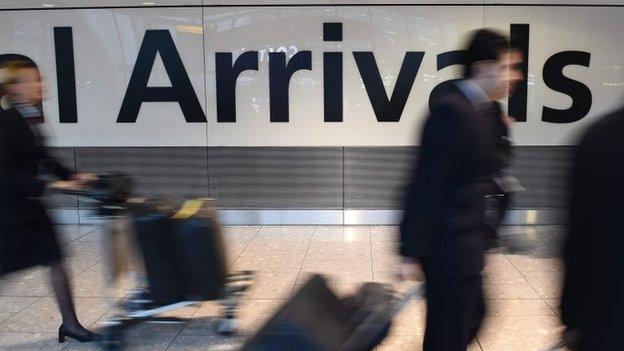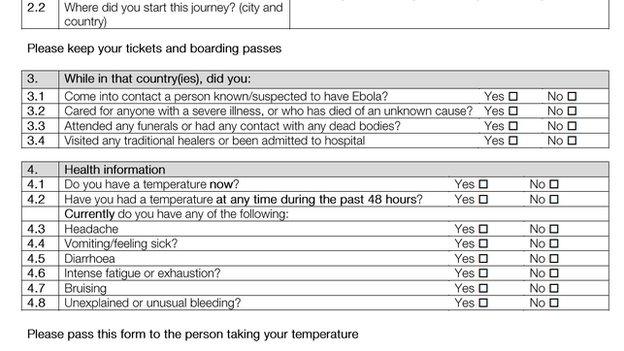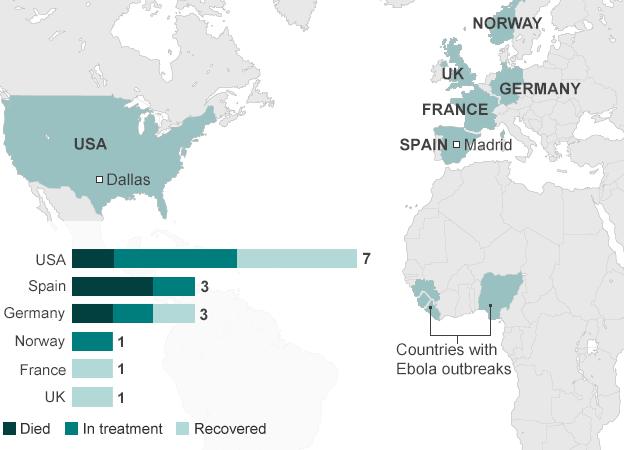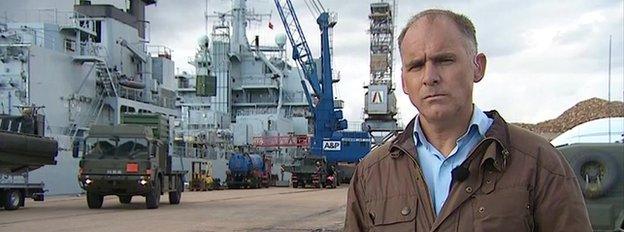Ebola screening begins at Heathrow airport
- Published

Passengers arriving at Heathrow airport from Ebola-affected countries have been screened by health officials.
The government said "a few passengers" had their temperatures checked and filled in a health questionnaire at Terminal 1 on Tuesday.
Screening will be extended to Heathrow's other terminals by the end of the week, and Gatwick airport and Eurostar next week.
The measures are set to cost £9m over the next six months.
The UK and the US have both introduced screening measures in response to the threat from Ebola, which has killed more than 4,000 people in West Africa.
The first flight subjected to the screening left Liberia for Brussels on Monday night, with transfers coming into Heathrow at 09:30 BST on Tuesday.
High-risk passengers were flagged up to border control and passed on to health workers from Public Health England who then carried out the actual screening.
The Department of Health estimates that 85% of all arrivals to the UK from affected countries will come through Heathrow.
There are no direct flights to the UK from the three worst-affected countries - Liberia, Sierra Leone or Guinea.

Passengers complete a risk questionnaire on arrival
Public Health England director Dr Paul Cosford said: "This is a set-up process. We will be learning from the experience today and over coming days as to how it is working.
"The principle benefit is about distributing information to people about how to contact, the symptoms to look out for, and who to contact in the event that they do get symptoms when they are in this country."
He said the expectation was that everyone who was asked to go through the process would do so.
He said the information given out via leaflets, and protocol about who to call if affected, was as important as the screening.
No system was "100% certain" but it was about reducing the risk as much as possible, he added.
He said the overall risk to the UK remained low, and the domestic health system was "world class and ready to respond".

Ebola patients treated outside West Africa*

*In all cases but two, first in Madrid and later in Dallas, the patient was infected with Ebola while in West Africa.
Avoid direct contact with sick patients as the virus is spread through contaminated body fluids
Wear goggles to protect eyes
Clothing and clinical waste should be incinerated and any medical equipment that needs to be kept should be decontaminated
People who recover from Ebola should abstain from sex or use condoms for three months

The Border Force does have legislation to be able to compel people to be screened if they are deemed to be a public health risk.
Border Force chief of staff Dan O'Mahoney said he did not anticipate any problems.
"We envisage that most people will be fine with the request to undertake that screening," he said.
"If it becomes an issue and we find a number of people are saying they don't want to undergo that screening we will need to look at the words we use and how we are actually referring them on to PHE."
Mr O'Mahoney said about 1,000 passengers a month flew into Heathrow from the affected countries, 0.05% of its total traffic.
One of the first passengers to be screened, Sorious Samura, 51, who had been in Liberia filming a documentary about the outbreak, was not impressed with the system.
He said: "Most of the people who had been on our flight from Liberia to Brussels didn't go into the screening room, they just seemed to go through to customs and presumably out of the airport.
"I only filled in the questionnaire and went through the screening because I felt a sense of responsibility, having seen the effect of Ebola where I've been."

At the scene

By Jonathan Beale, defence correspondent, BBC News
At 28,000 tonnes RFA Argus is one of the Royal Navy's larger support ships. Now docked at Falmouth she's being loaded with supplies to help the British military in the fight against the deadly Ebola virus. On board they're storing hospital beds, medical equipment and protective clothing in her massive cavernous hangar.
Above, on her large flat deck, Argus will carry three Royal Navy Merlin helicopters to fly people and equipment around. The ship will act as an offshore base as the troops set up four Ebola treatment centres in Sierra Leone. There is a hospital on board along with 80 medical staff.
But it won't be used to treat anyone who's contracted the virus. Should any of the crew or the Royal Marines on board become infected they would be kept in isolation and then taken to one of the clinics on the ground.
The marines will help offload the supplies when Argus reaches the coast of Sierra Leone, after a 10-day voyage. They say they're not worried about being infected by Ebola because they'll have little contact with people on the ground. Maj Luke Davis says malaria is as much of a concern.

Under the screening measures, passengers are identified by UK Border Force officers on arrival before nurses and consultants from Public Health England carry out the actual screening.
They will have their temperatures taken, complete a risk questionnaire and have contact details recorded. Anyone with suspected Ebola will be taken to hospital.
Passengers deemed to be at high risk due to contact with Ebola patients, but who are displaying no symptoms, will be contacted daily by Public Health England.
Questions asked on the form include "did you come into contact with a person known/suspected to have Ebola" and "do you have a temperature?".
The World Health Organization (WHO) said there were estimates of 8,914 cases of Ebola now reported in west Africa and 4,447 deaths.
WHO assistant director general Bruce Aylward told a news conference in Geneva that there could be 5,000 to 10,000 new cases per week by December.
He said one of the main concerns was the increase in the number of cases in the capital cities of the affected countries.
A 56-year-old UN medical worker, originally from Sudan, has died from Ebola at a hospital in Leipzig, Germany, despite receiving experimental drugs to treat the virus.
The UK government has pledged £125m "to help contain, control, treat and defeat Ebola", hundreds of NHS staff have volunteered to travel to West Africa and 750 troops have been deployed to help build treatment centres and provide logistical support.
UK casualty vessel RFA Argus, which has a fully-equipped hospital, is expected to set sail for Sierra Leone later this week. It will not be used to treat Ebola-infected patients but mainly to ferry kit and people.
There is no cure or vaccine for Ebola, which is transmitted through sweat, blood and saliva.

Ebola: What to do in the UK?

Ebola is spreading across West Africa, but experts do not expect many cases in Europe
Symptoms of Ebola include fever, headache, vomiting, diarrhoea, bleeding - but these are similar to more common infections like flu and some stomach bugs.
If you have these symptoms and have had contact with an Ebola patient then ring 111 first, external, do not go directly to A&E or a GP.
If there has been no contact with Ebola then seek help from 111, your GP or A&E if necessary.
The chances of developing Ebola in the UK remain low.
